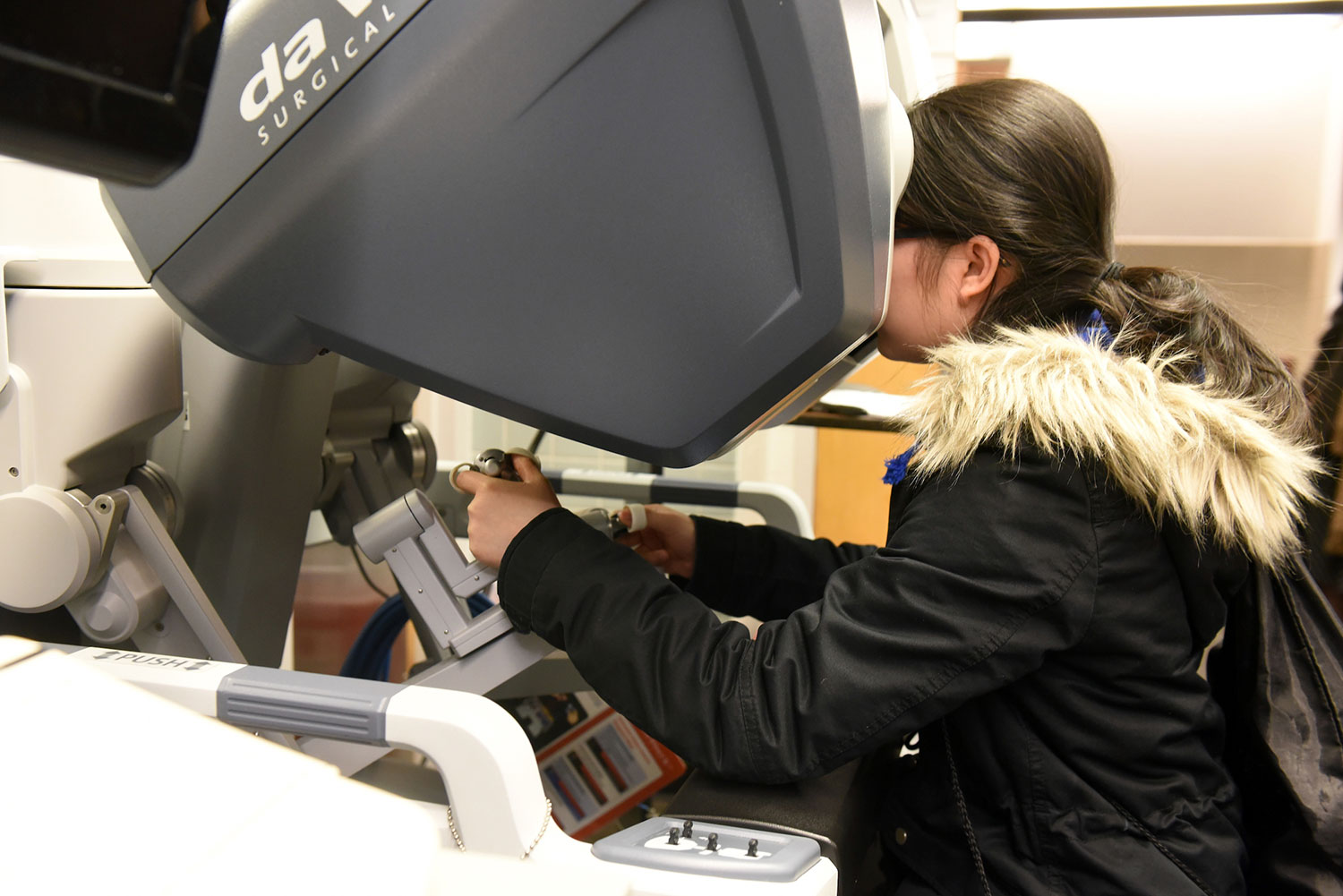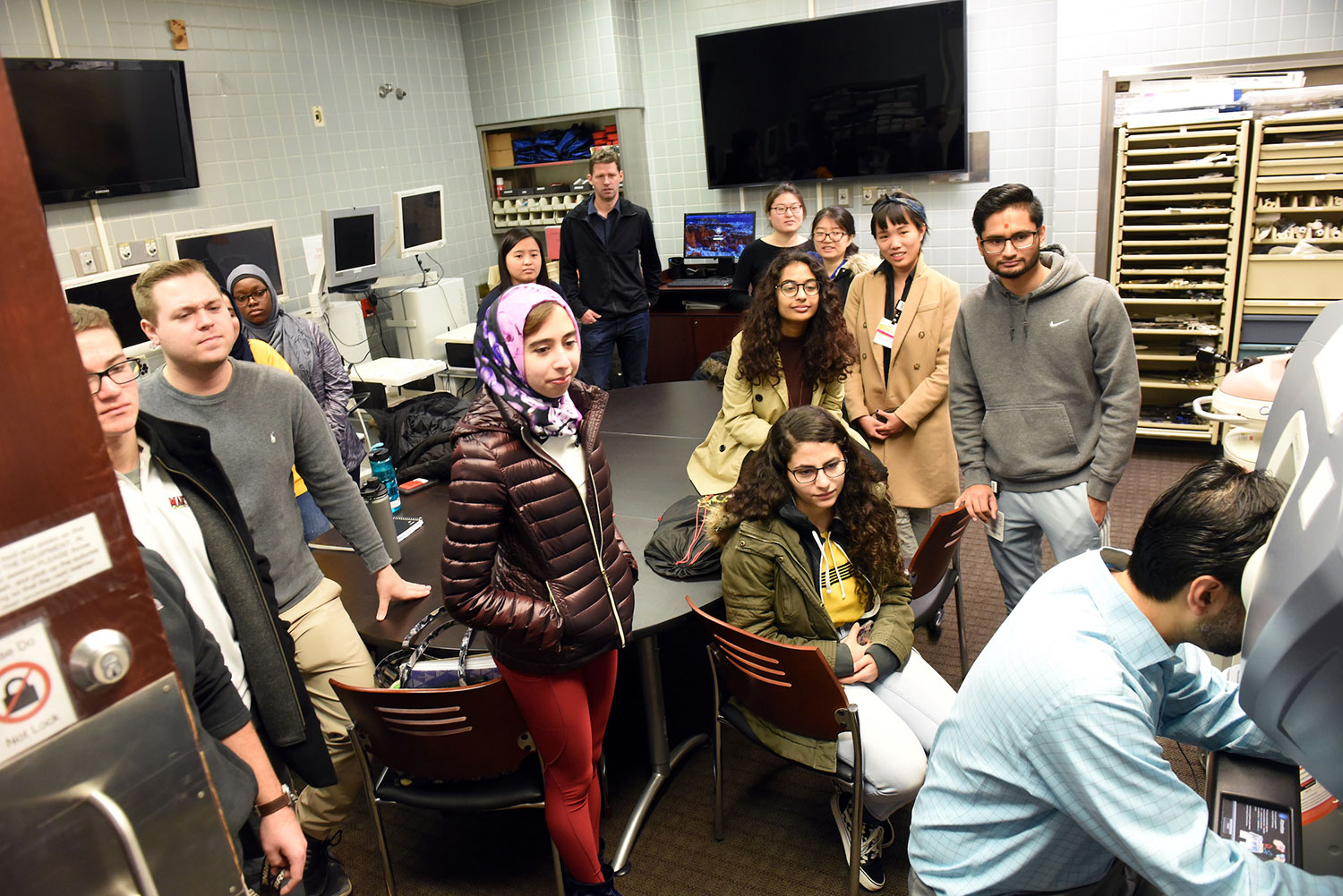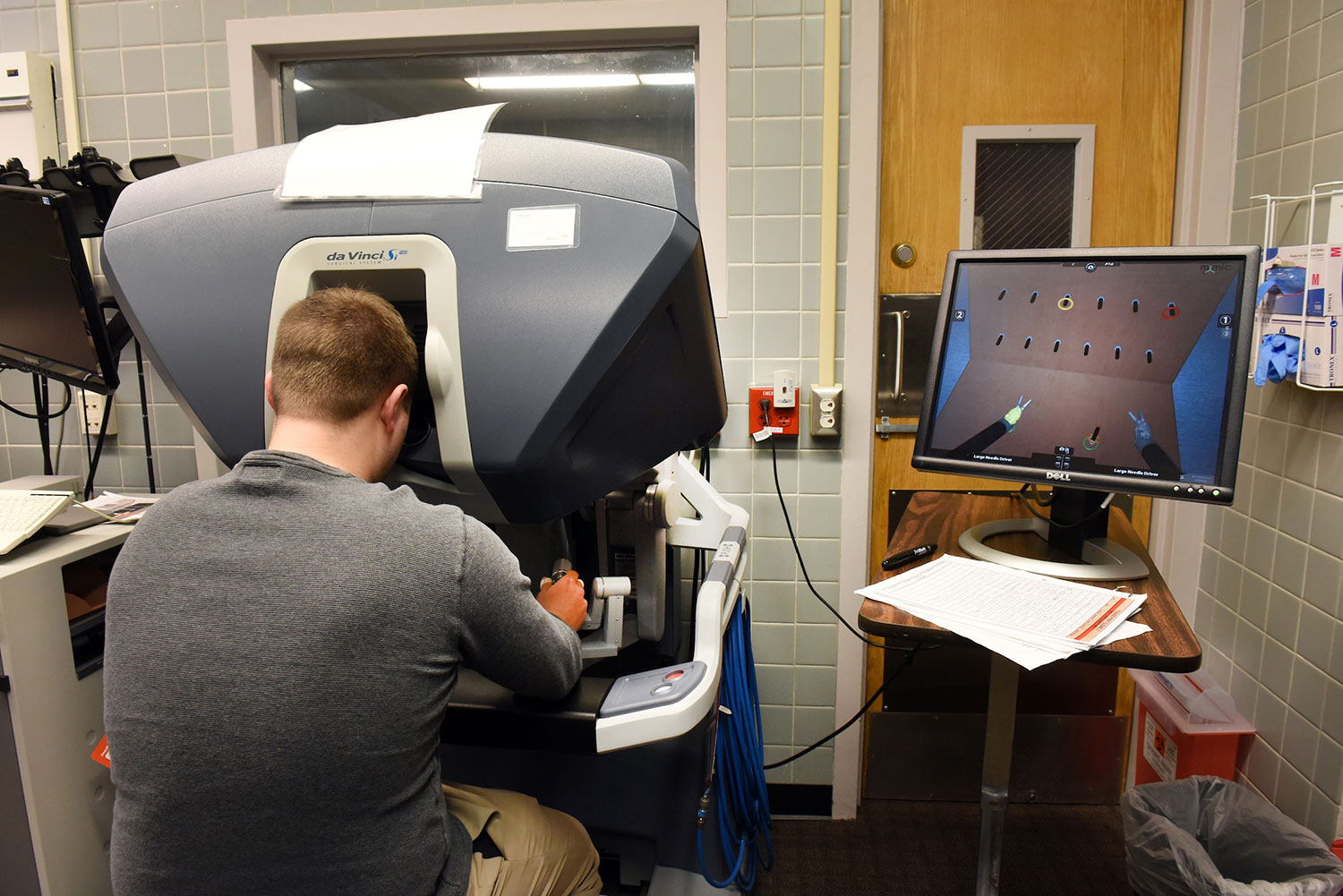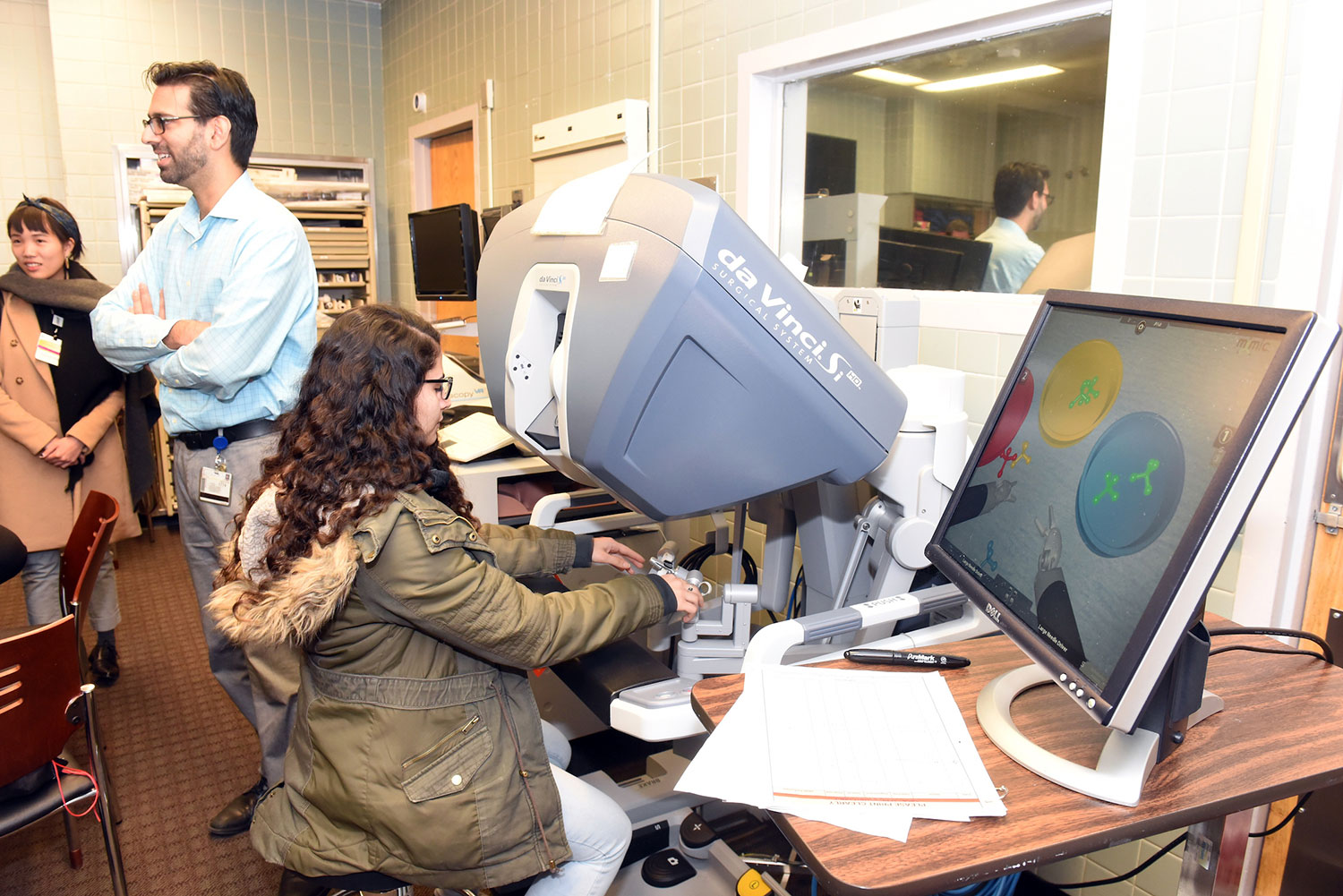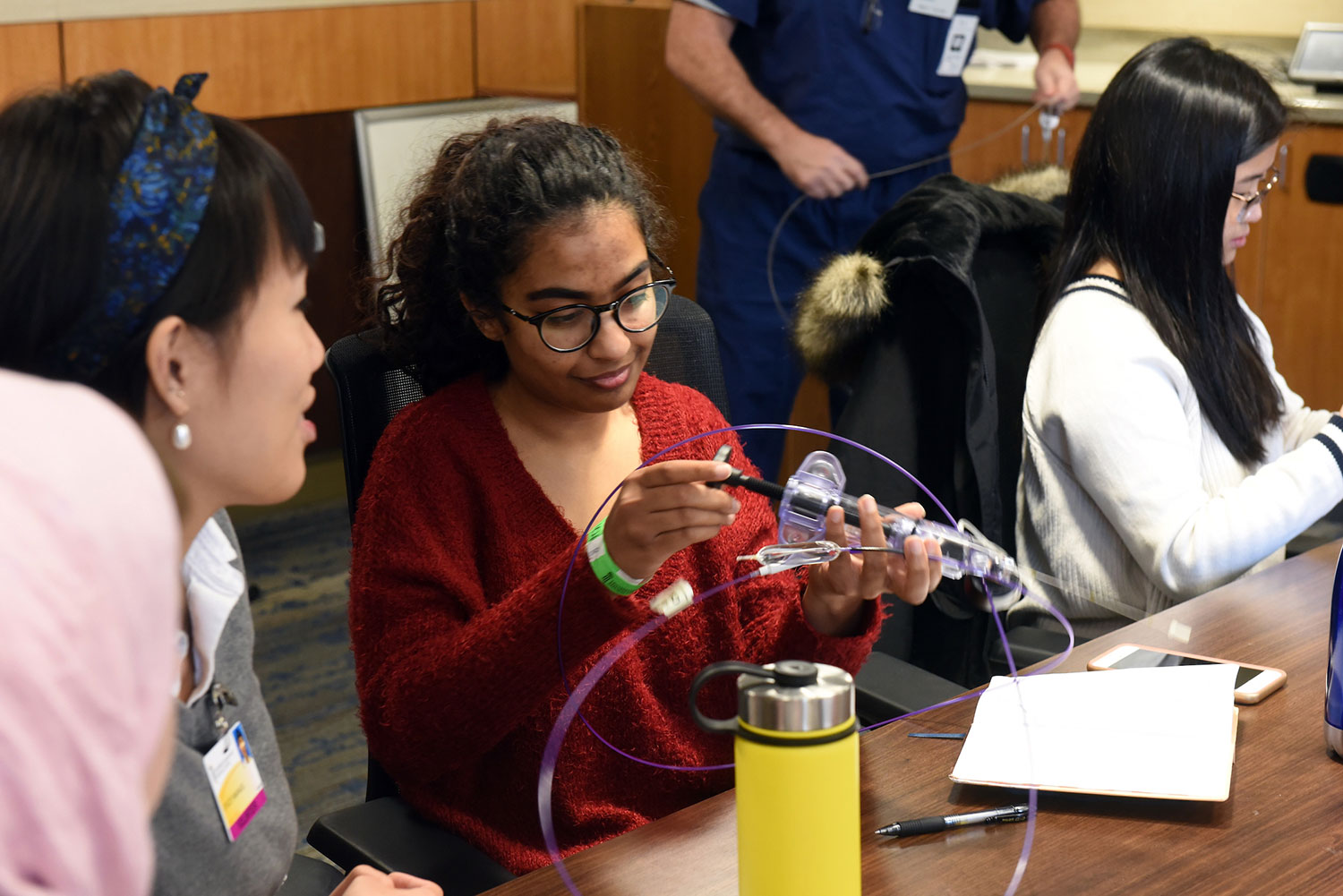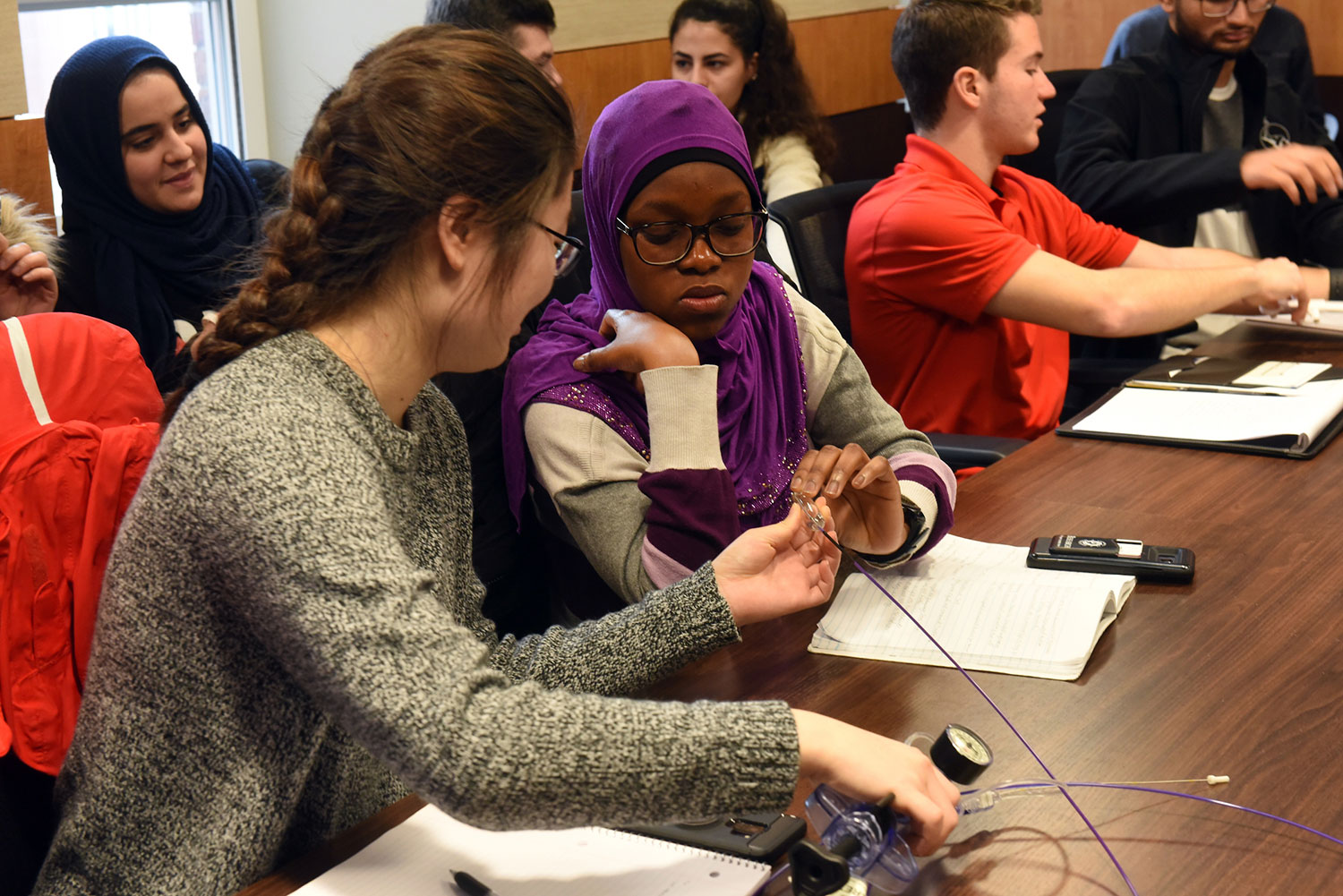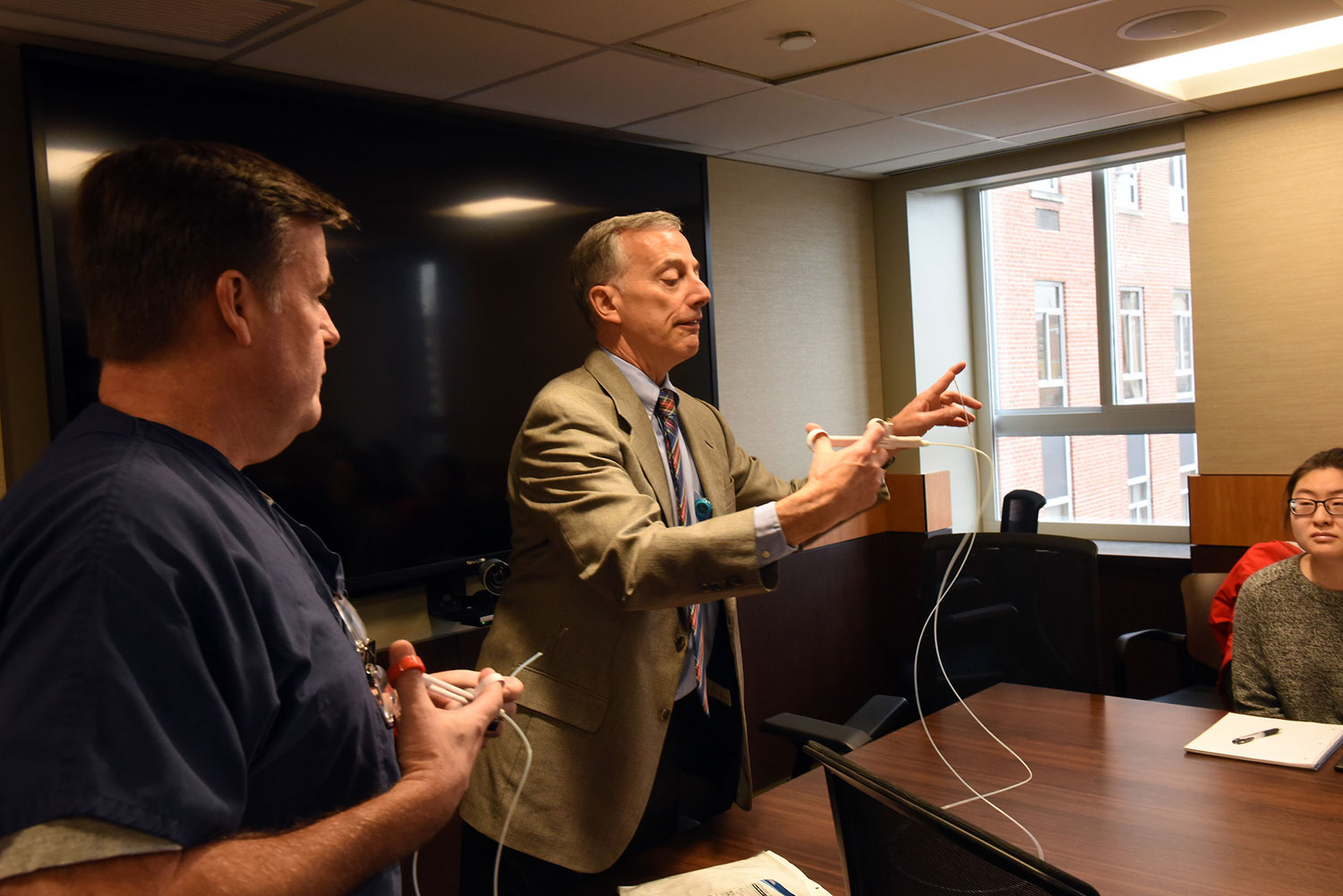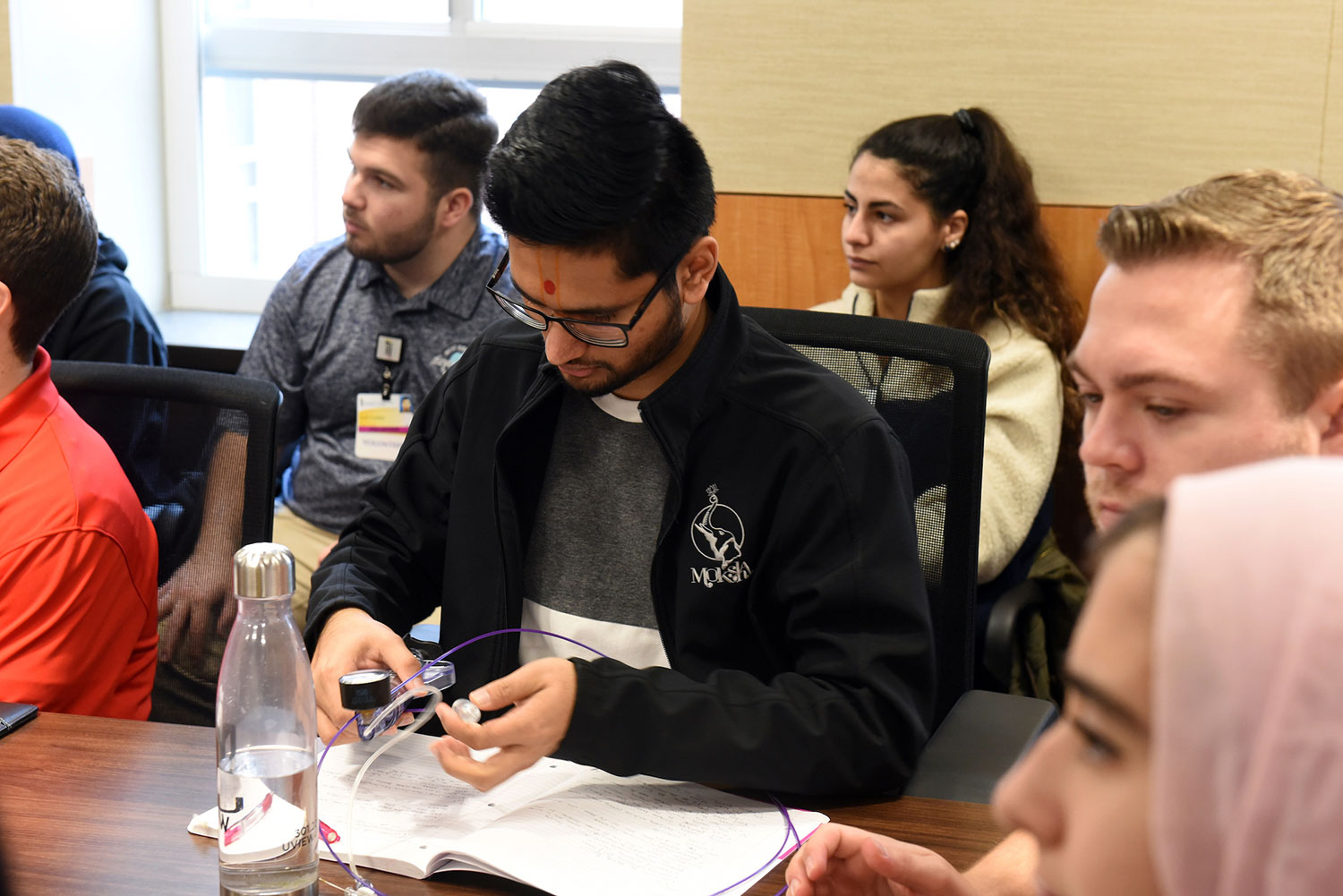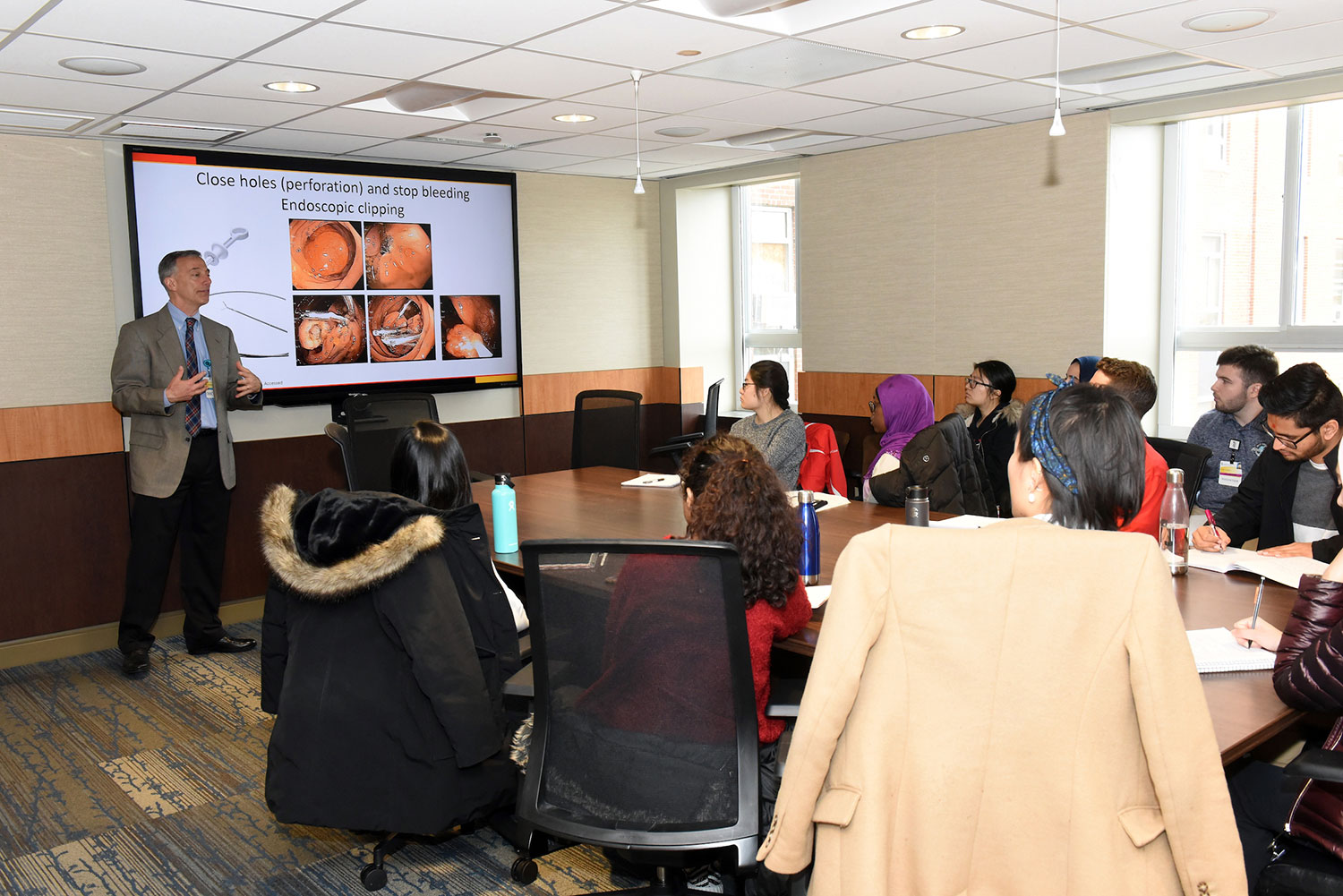January 28, 2019
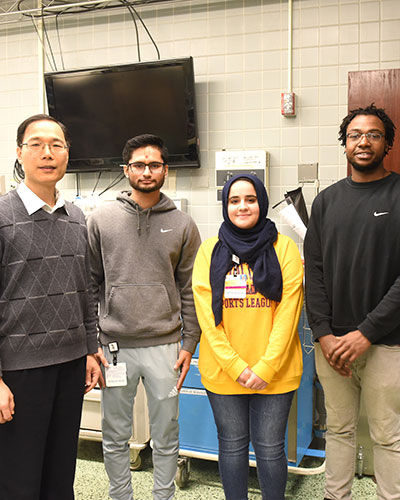
UMCP Students Experience Firsthand the Robust Link Between Engineering and Medicine
The University of Maryland Strategic Partnership: MPowering the State has gained significant momentum, delivering enhanced economic, academic, and research benefits for the people of Maryland and beyond. This strategic partnership is a structured research and academic collaboration between the University of Maryland, Baltimore (UMB) and the University of Maryland, College Park (UMCP). Leveraging the sizeable strengths and complementary missions of both institutions, MPower has created many unique educational opportunities for students at both universities.
The University of Maryland A. James Clark School of Engineering’s Robert E. Fischell Department of Bioengineering, in collaboration with the University of Maryland School of Medicine (UMSOM), has implemented several new initiatives to strengthen the pathways to professional degrees and address the needs of the bioengineering workforce. One of these initiatives is a three-week clinical experience program offered to UMCP junior and senior undergraduate bioengineering students held at the University of Maryland Medical Center (UMMC), where they can learn directly from UMSOM clinicians. The course has proved so attractive that it has “sold out” immediately on the first day of registration over the past two years.
“The clinical experience program is a very popular course,” said Christopher Chester, a senior bioengineering student at the UMCP. “I am glad I was able to take this course in my final year.”
Along with other UMCP bioengineering faculty, Yu Chen, PhD, Associate Professor, Fischell Department of Bioengineering at the UMCP and Program Director of this three-credit course, selected several clinical areas for study as well as UMSOM clinicians and engineering faculty instructors. In the first two weeks of the course, students benefited from daily lectures by UMSOM faculty on a wide selection of clinical topics, including neurology, pediatrics, pathology, radiology, and surgery. A bioengineering lecture from UMCP faculty followed, which expanded on the frequently used technologies and biomedical devices in these respective clinical areas. The students also toured labs and the MASTRI Center in UMMC, observed clinical environments and surgical procedures, and held discussion and brainstorming sessions at the end of each class. As a final deliverable of the course, students were asked to prepare a problem statement describing an opportunity to use engineering to improve a clinical specialty of their choice.
“Getting this first-hand experience from the doctors who use this type of technology is something we don’t usually see on our campus,” said Dhruvesh Amin, a junior bioengineering student, while practicing how to stitch using the daVinci robot system, a robotic surgical system designed to perform minimally invasive surgery. Minhaj Siddiqui, MD, Associate Professor of Surgery, and Director of Urologic Oncology and Robotic Surgery, was one of 15 UMSOM faculty presenters for this year’s session. “The daVinci surgical system has made it easier to perform urological procedures such as prostatectomies and hysterectomies,” said Dr. Siddiqui. “In the operating room of the future, robots will be a vital part of the surgical team.”
The Fischell Department of Bioengineering receives funding support through the University of Maryland Strategic Partnership: MPowering the State. This dynamic partnership continues to bring together engineers, clinicians, scientists, and students working to design and build biomedical devices that address many of today’s most pressing human health challenges.
“The outstanding strengths in engineering at UMCP combined with the state-of the art care and services at UMSOM and UMMC, creates incredible opportunities for collaboration, innovation, and discovery,” said Dr. Chen.
About the Fischell Department of Bioengineering
Located just a few miles from Washington, D.C., the University of Maryland A. James Clark School of Engineering is at the center of a constellation of high-tech companies and federal laboratories, offering students and faculty access to unique professional advancement opportunities with industry and government partners.
In 2005, the Clark School of Engineering benefactor Robert E. Fischell and his family donated $31 million to establish the Fischell Department of Bioengineering and the Robert E. Fischell Institute for Biomedical Devices. The Fischell Department of Bioengineering is a forward-thinking academic organization dedicated to utilizing engineering and scientific knowledge and methods to assist the citizens of Maryland and the nation. The department develops biologically based knowledge and products to promote ecological, human, and animal health, to improve the quality of life while maintaining a healthy environment.
About the University of Maryland Strategic Partnership: MPowering the State
The University of Maryland Strategic Partnership: MPowering the State is a collaboration between the state of Maryland’s two most powerful public research institutions: the University of Maryland, Baltimore (UMB) and the University of Maryland, College Park (UMCP). MPower combines the extraordinary resources of the state’s largest public research engines to strengthen and serve the state of Maryland and its citizens.
The University of Maryland Strategic Partnership Act of 2016 strengthened and formalized the structured relationship between UMB and the UMCP, which began in 2012. The law deepens the alliance to pursue even greater transformative change and impact, far surpassing what each institution could do independent of each other.
About the University of Maryland School of Medicine
Now in its third century, the University of Maryland School of Medicine was chartered in 1807 as the first public medical school in the United States. It continues today as one of the fastest growing, top-tier biomedical research enterprises in the world -- with 43 academic departments, centers, institutes, and programs; and a faculty of more than 3,000 physicians, scientists, and allied health professionals, including members of the National Academy of Medicine and the National Academy of Sciences, and a distinguished recipient of the Albert E. Lasker Award in Medical Research. With an operating budget of more than $1 billion, the School of Medicine works closely in partnership with the University of Maryland Medical Center and Medical System to provide research-intensive, academic and clinically-based care for more than 1.2 million patients each year. The School has over 2,500 students, residents, and fellows, and more than $530 million in extramural funding, with most of its academic departments highly ranked among all medical schools in the nation in research funding. As one of the seven professional schools that make up the University of Maryland, Baltimore campus, the School of Medicine has a total workforce of nearly 7,000 individuals. The combined School and Medical System (“University of Maryland Medicine”) has an annual budget of nearly $6 billion and an economic impact more than $15 billion on the state and local community. The School of Medicine faculty, which ranks as the 8th highest among public medical schools in research productivity, is an innovator in translational medicine, with 600 active patents and 24 start-up companies. The School works locally, nationally, and globally, with research and treatment facilities in 36 countries around the world. Visit medschool.umaryland.edu/
Contact
Office of Public Affairs
655 West Baltimore Street
Bressler Research Building 14-002
Baltimore, Maryland 21201-1559
Contact Media Relations
(410) 706-5260
Related stories

Thursday, November 10, 2022
University of Maryland Strategic Partnership Announces New Institute to Transform Medicine Using Big Data and Artificial Intelligence Technologies
The University of Maryland Strategic Partnership: MPowering the State (MPower) today announced a transformative partnership to establish the University of Maryland 3 - Institute for Health Computing (UM-3-IHC), which is being led by the University of Maryland, Baltimore (UMB) and the University of Maryland, College Park (UMCP), in collaboration with the University of Maryland Medical System (UMMS) and Montgomery County, Md. This new Institute will leverage recent advances in artificial intelligence (AI) and computing to create a premier learning health care system that evaluates both de-identified and secure digitized medical health data to diagnose, prevent and treat diseases in patients across the state of Maryland.
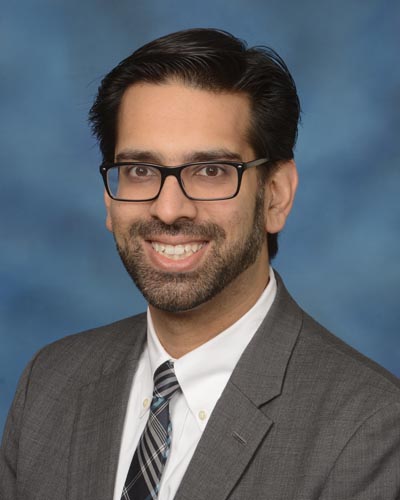
Monday, March 22, 2021
University of Maryland School of Medicine Researchers Awarded Funding to Lead National Discussion on Active Surveillance for Men with Low Risk Prostate Cancer
Researchers at the University of Maryland School of Medicine (UMSOM) have been awarded $100,000 in funding through the Eugene Washington PCORI Engagement Awards, an initiative of the Patient-Centered Outcomes Research Institute (PCORI). The funds will support a national discussion and conference aimed at identifying evidence gaps to guide future research on the use of active surveillance to monitor low-risk prostate cancers. This approach will serve as an alternative to immediate treatment with surgery, radiation, or hormone therapy which all have potentially debilitating side effects.

